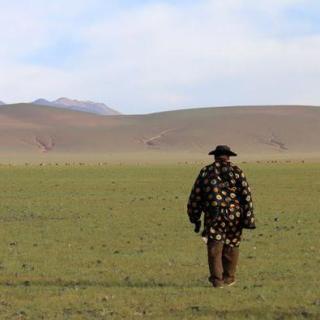
介绍:
Changtang, which means "northern wilderness" in Tibetan, is a vast, desolate highland stretching across Tibet Autonomous Region, Xinjiang Uyghur Autonomous Region and Qinghai Province. Due to its high elevation, even in the summer, the weather here is harsh and windy.
But when the first sunlight washes over Nyima County of southern Changtang, 58-year-old Gagya Darma has already raced over on his motorcycle.
"There is no regular hour for me to leave home. But basically, I take off for patrol around 7, 8 o'clock in the morning and come back home around 6 or 7 PM. If there is a large number of chiru , I will ride to the snowy mountainous area, which usually takes me a day. "
Once a veterinarian, Gagya Darma has been a mountain patrol for the past 15 years. A motorcycle, a telescope, a bedding roll, plus a bag of rations for one-day journey, are his daily outfits.
"The size of my patrol area is around four hundred square kilometers, which equals with two Tibetan counties. Since many people live nearby, I need to remain vigilant all the time. If someone drives cars or motorcycles into the reserve, I will question their motives and exhort them to leave. "
The area that Gagya Darma cruises around belongs to Changtang National Nature Reserve. Established in 1990s, it is the world's second largest nature reserve as well as the habitat for many endangered species, including chiru, Tibetan wild ass, snow leopard and black-necked crane. Thus keeping an eye on local fauna is a patrol's priority.
Spotting the trace of a crowd of animals, Gagya Darma pulls out the telescope from his cloak and asks us to stop.
"They are running away. See, there are chirus scattering everywhere. But we can't approach any further. Otherwise, they will scoot. "
Taking notes of the date, the antelopes' quantity and sex ratio in a booklet, the former nomad explains like an expert.
"Chirus could be found quite frequently. Particularly in October and November, I could walk a little bit closer without disturbing them. But around this time of the year, female chirus just have their calves. If we go any further, it would be really dangerous for the young cubs, since mother chirus will lead them to run without stop. "
Since Changtang is one of the five major pastoral regions in China, pastures overlap with the reserve. Here, human, livestock and wildlife are drawn together in close-knit ways. How to balance their relationship has become Gagya Darma's biggest concern.
"Herdsmen prefer to fence their pastures by wire, which may result in the imprisonment of wild animals. If that occurs, I need to teach herders how to release them. In normal circumstance, the grassland is a mix of livestock and wildlife. But coming to the mating and breeding seasons, chirus will require larger meadows to survive. I have to restrict grazing."
Day after day, Gagya Darma ventures into the wild all by himself. He barely breaks off from this daily routine, even during the arctic winter, when the average temperature could drop to minus twenty degree centigrade. When fatigue hits, the patrol will pick up rocks to build a stove and apply dried animal waste as fuel to boil water, and then enjoy a cup of Tibetan butter tea. That short break has become his most welcomed interval of a day.
But this burly middle-aged man rarely complains.
"Ever since I have become a patrol, I always regard myself as a guardian of wild animals. I also tell others that protecting wildlife is everyone's responsibility. You know, when I first started this job, we only got 60 chirus around here. But thanks to the support of forestry policemen and other patrols, the number of chiru here has risen to over three thousand. "
In Gagya Darma's Tibetan-styled house, three posters on the wall are most eye-catching. Each of them is painted with the pictures of different wild animals and their names. Although the head of this household is not very talkative, he is willing to show his fervent love towards wildlife through actions.
"I can't leave those animals behind. As long as I am fit, I won't retire. I have a son. Hopefully, he could become a patrol one day."
According to Nukhyung, head of Nyima County Forestry Police Bureau, the local government has recruited over 130 patrols from local herdsmen so far. This year, the quota will increase to over 200 and more conservation stations will be built.
"Without those wild animals, the climate and ecosystem of Changtang will change fundamentally. As a land belonging to man, livestock and wildlife, Changtang will never be the same if we leave any party behind. That's why we are doing our best to protect wildlife here."
Accordingly, compared with 1980s, when Tibetan antelope was on the verge of dying out, the sum of the species has already reached 200 thousand in recent years.
大家还在听

